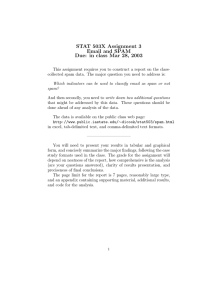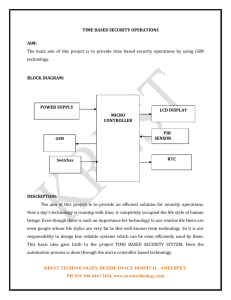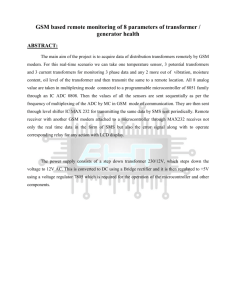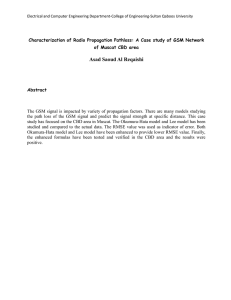GSM Association Mobile Spam ITU Workshop The Evolving Regulatory Environment for Future Mobile
advertisement
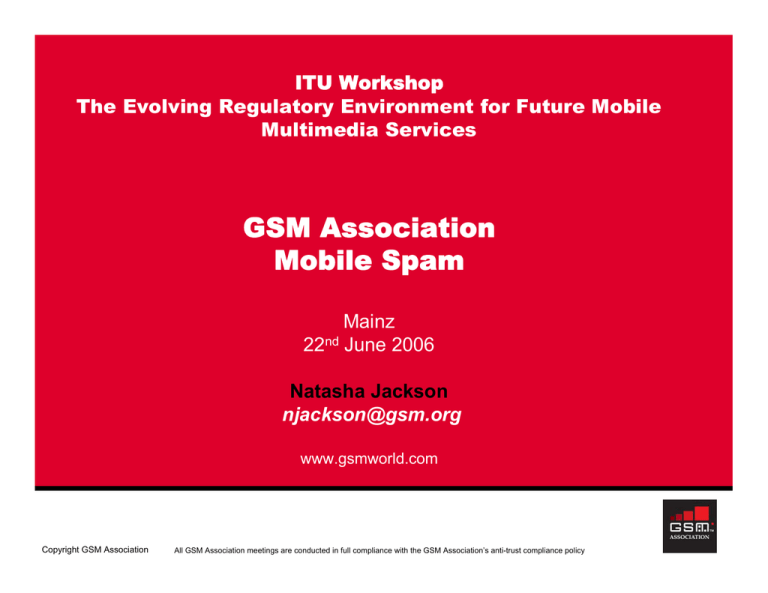
ITU Workshop The Evolving Regulatory Environment for Future Mobile Multimedia Services GSM Association Mobile Spam Mainz 22nd June 2006 Natasha Jackson njackson@gsm.org www.gsmworld.com Copyright GSM Association All GSM Association meetings are conducted in full compliance with the GSM Association’s anti-trust compliance policy The GSM Association VIMPELCOM Confidential 180 key partners 213 countries, 690 operators, Copyright GSM Association 2 Mobile Spam • Unsolicited communications sent via SMS or MMS – Advertising a commercial service or product – Encouraging a premium rate response (typically fraudulent) Confidential Copyright GSM Association 3 Mobile Spam • Mobile spam may exploit or annoy customers • But has NOT been an issue compared to internet email spam • Mobile environment is inherently resistant to spam Confidential Copyright GSM Association 4 Operator Measures • Economic measures – ‘Calling party pays’ – Withholding fraudulent premium service payments – Revised roaming agreements • Customer tools – Spam reporting facilities – Unsubscribe mechanisms • Technical initiatives – Network filtering – Traffic analysis where laws allow Confidential Copyright GSM Association 5 National Measures • Most countries have national laws relevant to unsolicited SMS and MMS • Operators have procedures for identifying and dealing with fraudulent messaging Confidential Copyright GSM Association 6 However… • Spam sent across networks, or internationally, is harder to combat • There is disparity in national legal environments • Consumer irritation has the potential to undermine new services Confidential Copyright GSM Association 7 GSMA Focus on Mobile Spam GSMA objective: Coordinated approach to mobile spam • Ensure customers receive minimal amounts of spam • Provide a common basis for operators to work together and share best practice • Protect the secure and trusted environment of mobile services Goal: Global Code of Practice Progress: Endorsed by GSMA Board, launched Feb 2006 Confidential Copyright GSM Association 8 The Code of Practice • Voluntary • Covers unsolicited SMS and MMS communications • Designed to be complementary to local initiatives and national legislation Confidential Copyright GSM Association 9 The Code applies to: • Commercial messages sent to customers: – without their consent – encouraging them directly or indirectly to call or send message to premium rate number • Bulk unlawful or fraudulent messages sent to customers – e.g. faking, spoofing, scam messages Confidential Copyright GSM Association 10 Key Commitments 1. Include anti-spam conditions in contracts with third party suppliers – Commitments not to send spam, to provide customers with opt-out of further communications, and penalties for breach 2. Provide a consent mechanism for customers with respect to operators own mobile marketing communications – Clear and transparent consent processes; records of consent; and obvious, clear and efficient opt-out of further communications 3. Work co-operatively with other mobile operators to fight spam – Nationally and internationally Confidential Copyright GSM Association 11 Key Commitments 4. Provide customers with information and resources to help them minimise the level and impact of spam – – Information and advice (through customer services, print and website) Spam reporting facilities 5. Undertake other anti-spam activities – – – – Anti-spam policy and procedures Investigation of complaints Adoption of GSMA recommended techniques Monitoring traffic for signs of spam (where allowed) 6. Encourage governments and regulators to support industry Confidential Copyright GSM Association 12 GSMA Commitments 1. Monitor the adoption, implementation and need for further action 2. Invite signatories to provide information on effectiveness 3. Assist in resolving inter-network issues and cases of persistent illegal or fraudulent activity related to mobile spam Confidential Copyright GSM Association 13 Coverage to date > 60 countries, >500m subscribers Confidential Copyright GSM Association 14 Next Steps • Encourage operator sign-up • Examine issues associated with other types of spam • Encourage governments and regulators to support industry in its efforts Confidential Copyright GSM Association 15 Governments and Regulators • Support industry self-regulation mechanisms • Support the development of responsible mobile marketing and premium rate industries – Codes of practice that promote effective consent principles, transparency and clear pricing • Review national legislation that may inhibit anti-spam activities, for example – Permit the use of network level filtering to identify and prevent mobile spam reaching customers. – Address data protection / privacy law or premium rate payment issues that may hamper mobile operators’ ability to investigate mobile spam abuses. • Consider steps that prevent spammers from profiting financially – Allow operators to withhold payments to suspected mobile spam destinations, pending investigation of their spam activities by the relevant public authorities Confidential Copyright GSM Association 16 Thank you Natasha Jackson njackson@gsm.org +44(0) 7748 937009 Copyright GSM Association All GSM Association meetings are conducted in full compliance with the GSM Association’s anti-trust compliance policy
